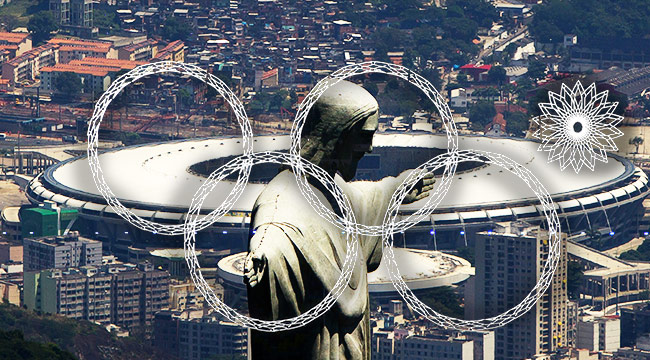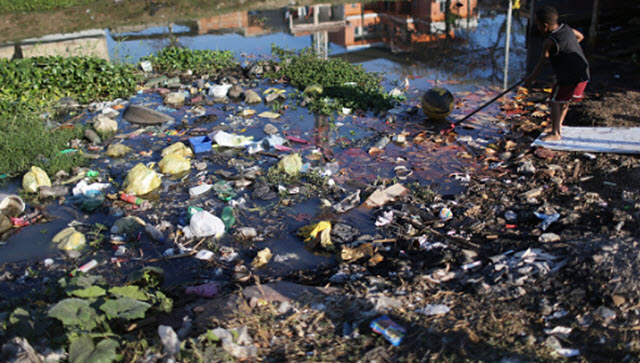
When the Olympics roll around every two years — counting both Summer and Winter — the games are supposed to elicit feelings of hope, sportsmanship, and national pride. But in reality, they often leave debt, controversy, and decrepit, abandoned Olympic venues in their wake. Hosting the games will ideally pump prestige and dollars into hosting cities, but recently, the process has seemed to cause grief and headaches in abundance.
Olympics fans were recently blessed with some pretty smooth ceremonies with the Beijing, Vancouver, and London games. These successes showcased what it means to host this tradition. But the Sochi Winter Olympics were a stunning reminder that when things go wrong, oh man, do they go wrong. And as the Rio de Janeiro Summer Games fast approach, viewers are starting to glimpse the same issues. #SochiProblems are starting to morph into #RioProblems. And many of the same issues plagued by the former city are now settling into the latter at a more alarming rate. Let’s compare what happened in Sochi with what could very well happen in Rio.
Filth, Pestilence … And The Weather
Ideally, those countries who win the honor of becoming Olympic host will tidy up to make sure the visiting athletes, dignitaries, and members of the press corps are comfortable. Neither Sochi nor Rio made sure they were adequately prepared to host such an event.
From the outset, the city of Sochi was not at all ready to be considered a host city. Keith Olbermann even called it “Russia’s Detroit.” Russia had violated numerous human rights laws, and boarding was not remotely close to being done for visitors. Further, animals were being slaughtered as a matter of convenience, and the water could have been described as “dangerous.” In addition, Sochi was experiencing unseasonably warm temperatures, which caused terrible course conditions and no snow, which is a no-brainer requirement for any Winter games.
Not to be outdone, the Rio Summer Games already have their own share of problems. Sewage and pollution issues have turned the normally beautiful city into a cesspool of disease. The Associated Press conducted water tests in July 2015 and found disease-causing viruses levels directly linked to human sewage up to 1.7 million times the usual amount. Garbage and even dead animals contributed to this problem, and even worse, the Zika virus has caused some athletes to fear sickness and even entirely skip the games. When you’re losing athletes to sickness and fear, it may be a major sign that these Olympics are in trouble.

Budgets Got Busted, Not Balanced
Even before a city is awarded the distinction of hosting the Olympics games, they have to present an operating budget to not only the Olympic committee but their governments as well. Much of the budget is expected to go into infrastructure costs, and it is presumed, as for any mega project, that overages will occur. A study conducted by the Said Business School at the University of Oxford found that sports-costs for Olympic games were $3.6 billion alone, a pretty penny for any country. The last two Olympics have laughed at that number and bypassed.
When Russia bid for the Winter Olympics games in 2007, the country aimed to hover around the $12 billion mark, but as costs arrived, the number ballooned to $50 billion. It may be one thing to go a few billion over, but to double and even quadruple the budget seems disastrous. Much of that overspending can be assigned to Sochi’s state — which was not in the best shape to host a major, protracted sporting event — when the city was awarded the games.
While the Sochi Winter games blew past their budget, Rio has managed to keep its overruns slightly contained. Oxford University released a report finding Rio has only gone $1.6 billion over the proposed $3 billion budget. But even with a slight overrun, Rio has been slow to complete final preparations for the games. In fact, the Olympic committee called it “the worst” it has ever seen. And that is even compared to the mess that was the 2004 Athens Summer games.
Government Corruption And Financial Ruin
The budget for the 2016 games may pale in comparison to the Sochi Olympics, but Rio is facing an immense level of economic and governmental chaos. This differs from what happened in Sochi. With a former KGB agent at the head of the government, one would assume President Vladimir Putin would use all his power to ensure the winter games went off without a hitch. Well, the employed methods were more than unorthodox and may come back to haunt the country as the Rio Summer games inch closer.
Unlike the controlled Russian government, Rio and its political landscape are in disarray. Brazilian President Dilma Rousseff awaits an impeachment trial, and the city of Rio has declared a “State of Calamity,” meaning the broke state government will not be able to meet its financial responsibilities for the games. It’s a tough economic blow to a city that could have used the games’ goodwill to get back on track. The situation has grown so bad that Rio de Janeiro is not able to pay municipal workers, and thanks to a corruption scandal, the main revenue industries — oil and gas — aren’t able to properly contribute to the economy. The federal government did provide a bailout, but it only seems to bandage a much larger cut.
Severe Security Concerns
Economic perils and unfinished Olympic venues aside, the most important part of any Olympics is to keep the athletes and attendees safe at all costs. Participating countries set aside their political and cultural differences to showcase talent from across the globe. But there are still security concerns that each country should anticipate.
Outside of some trivial Wi-Fi problems, the Sochi Olympics were able to evade more serious threats like terrorism. Rio though, does not have those luxuries. The city has been consistently ranked as the “murder capital of the world,” which (on top of the Zika threats) is not a picture of tranquility. And with the recent global rash of terrorism, security looks to be even higher, and the Rio Olympics are taking massive precautions. Rio looks to have 85,000 security forces on hand, with 40 percent of them from the national military. Rio state security chief Jose Mariano Beltrame told CNN they have prepared for this event thoroughly: “Because terrorism was always treated as a priority, our infrastructure is very strong. We have been coordinating with delegations. We are ready.”
To put Rio’s security concerns into perspective, the 2012 London Summer Olympic Games only used 40,000 agents. And Rio is smart to worry, for authorities have just arrested 10 suspects of an alleged terror plot.
The Olympics are a time when countries come together and unite to showcase their global talent. In theory this is the greatest idea, but the last two Olympics have shown how poor planning and political unrest can quickly undo that feeling. #RioProblems are amping up even as the games are only weeks away. Over the weekend, Aussie athletes arrived and immediately declared their designated living quarters to be “uninhabitable.” This does not bode well, but let’s hope circumstances improve before the torch makes it to the Olympic stadium, even though that too may forecast #RioProblems.
